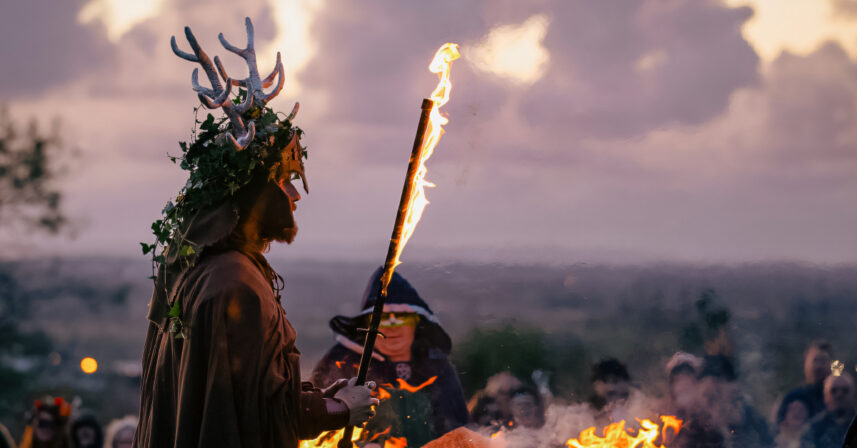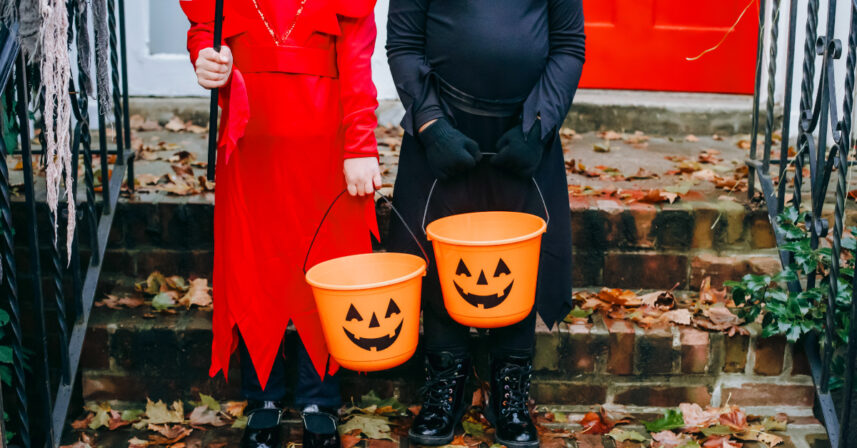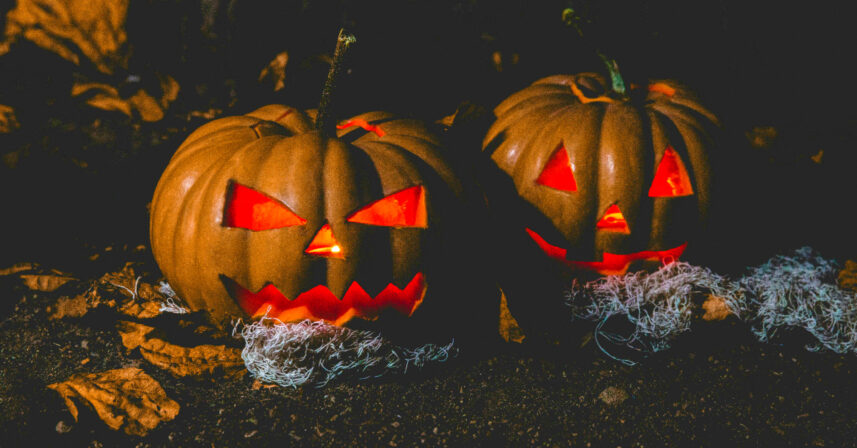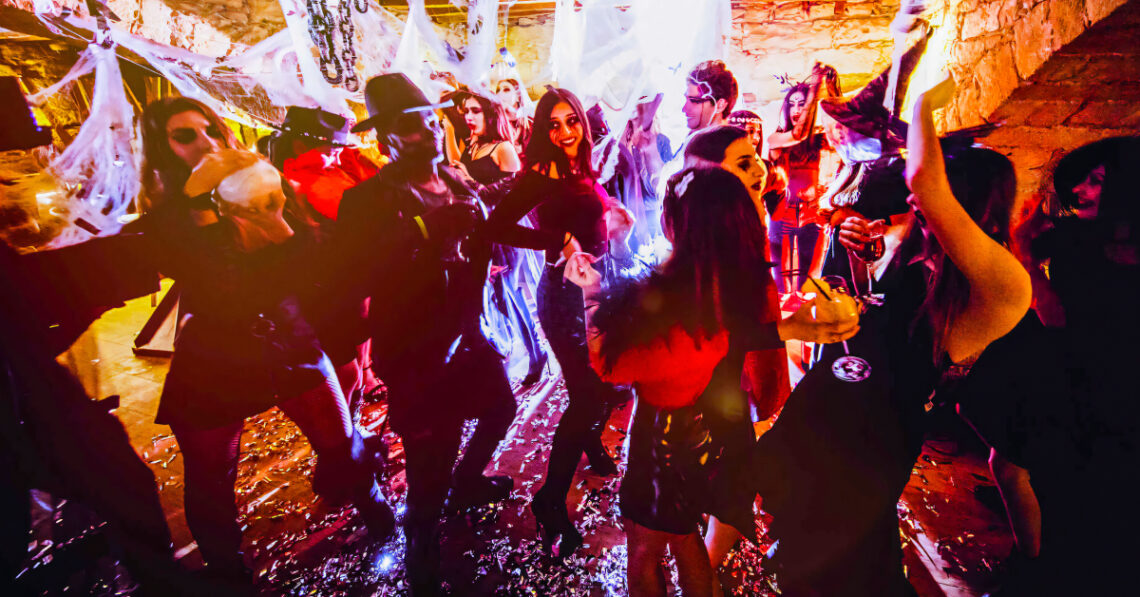It's all in the HISTORY!
The name Halloween actually comes from the term “All Hallows Eve”. It is the day before All Saints Day, which is a traditional holy day for all Christians to honor their saints. The actual tradition of Halloween is rooted in traditional Celtic history.
It is thought to be connected to the festival of Samhain (pronounced ‘Soo-when’ or ‘Saw-wen’) or the Celtic New Year’s Festival. The name itself actually means “summer’s end” and this festival would mean the closing of the harvest season and the coming of winter. Celtics believe that during this period, the veil between the world of the dead and the living are at it’s thinnest, allowing the dead to roam among the living.

Burn the crops! Sacrifice the animals!
Very little history is known about this tradition, but it is thought that during this period, the Celtics would cast huge bonfires, where the community would gather to burn crops and animals as sacrifices to their Celtic deities. During the celebration, the Celts would also wear costumes, which would usually consist of animal heads and skins, to tell each other’s fortunes and to disguise themselves from the roaming dead. It was likely from this tradition that we now wear costumes every Halloween!
Of course, nowadays as Halloween has been quite commercialized, most people would just cosplay, dress up and put on makeup for fun or for Halloween parties. It is now no longer required for people to dress themselves as ghosts or monsters as people can dress up as brands, memes and even fictional characters from popular movies, shows or games.
It's the TRICK or TREAT tradition

Pulling a trick or a prank can be offensive to some... is that why?
Every Halloween, you may open the door to find children in costumed dresses, asking for candies and sweets. It was thought that the earliest known attempt of trick or treating was in the early 16th century, as it was common for the poor in England to go begging on All Souls’ Day where eventually the children would take over the custom.
Later in the 19th century, “tricks” such as rattling windows and tying doors shut were often made to look as though supernatural forces had made them. Some people would eventually offer candy as a way to protect their homes from pranksters, thus giving rise to the use of the term “trick-or-treat”.
It's the story of Jack O-Lantern
The term “Jack-O-Lantern” comes from an Irish folktale about a man named Stingy Jack. Jack invited the Devil to drink with him but would not pay for his drink. Jack convinced the Devil to turn into a coin so he could buy their drinks, and once he did, Jack kept the money which prevented the Devil from turning himself back until Jack eventually freed him. Jack once again tricked the Devil into climbing a tree to pick a fruit but while the Devil was up in the tree, Jack carved a sign of the cross into the bark so that the Devil would not be able to come down.

"Can carved pumpkins really keep Jack and evil spirits away?"
Soon after, Jack died. Neither God nor the Devil wanted Jack to enter heaven or hell, thus the Devil sent Jack off into the dark night with only a burning coal to light his way. Jack placed the coal into a turnip and has been roaming the Earth with it ever since. The Irish began to refer to this ghostly figure as “Jack Of the Lantern”.
The Irish would carve out turnips and place coals inside it to ward off evil spirits and Jack himself. It was thought that when Irish immigrants brought this culture to America, Americans would use pumpkins instead of turnips as they are more readily available, and thus the culture of pumpkins being associated with Halloween began.

From Ancient Roots to Modern Celebrations: How Halloween Evolved
Despite coming from separate historical and cultural backgrounds, the traditions of Samhain, trick-or-treating and the tale of Stingy Jack have come together to help shape our modern interpretation of Halloween. From Celtic rituals and English customs to Irish folklore, these elements from different societies have now fused and evolved together, creating a holiday that now embraces costumes, candy and carved pumpkins. Each story, tale and tradition play a crucial role in the vibrant and diverse celebration of Halloween that we know and love.
WHY Halloween Isn’t Allowed In Malaysia?
While Malaysia is a multi-racial country as a whole, Islam is it’s principle religion. As such, there have been instances where the National Fatwa has issued notices to state that Muslims are prohibited from celebrating Halloween. Based on a fatwa released on it’s website, the national council has informed that Halloween is a Christian celebration of the dead and as such is against Islamic teachings, instead encouraging Muslims to pray for their deceased and read the Holy Quran instead.
Ultimately, whether you believe Halloween should be celebrated or not would be up to you. However, if you are still keen to experience terrifying scares in the spooky month of October, why not make a visit to Hauntu instead?
Experience a terrifying journey inside an immersive horror experience complete with roleplaying and decision making, as you make your way through a haunted hotel at The Linc or through a mystical dance academy at The Curve!
Useful Links
Learn More
Social
©Copyright 2026 Superdough Sdn Bhd (201401003805) | All Rights Reserved